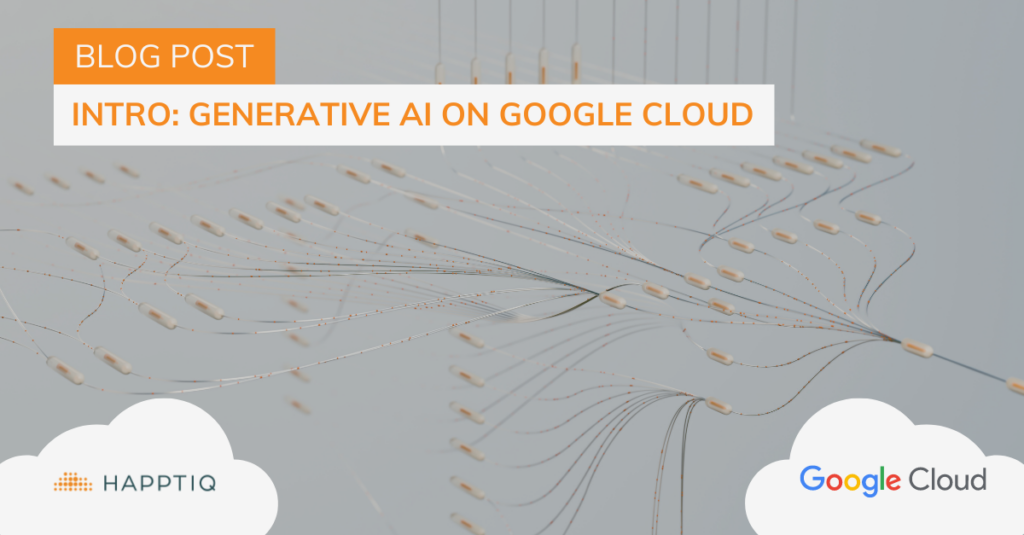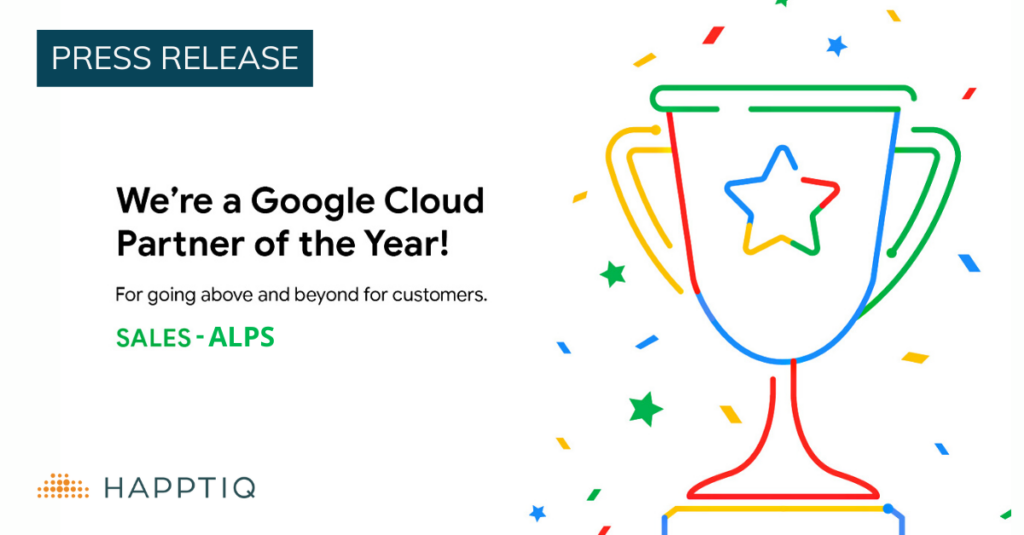Recap: Google Cloud Next ‘23
Google Cloud Next ‘23 kicked off on August 29, 2023, in San Francisco, California. In this three-day event, Google Cloud announced a plethora of new innovative solutions and upgrades to their current offerings to accelerate digital transformation for every enterprise and industry. The event mainly comprised two keynotes:
- An opening keynote – that showcased breakthrough product announcements, partnerships, customer stories, and more.
- A developer keynote – in which the hosts took developers through past technologies while providing exciting glimpses into an AI-infused future through insightful demos.
Throughout the event, Generative AI took center stage with Google Cloud launching a variety of new offerings across Vertex AI, Duet AI, and supporting infrastructure. So much happened during the event, and here’s a recap of what Google Cloud had in store at Next ‘23.
A New Way to Cloud with Generative AI
Google Cloud is taking a GenAI-first approach to make its offerings radically better. This was a standout theme in Cloud Next ‘23 as Google Cloud announced several new additions in Vertex AI and Duet AI.
New models and capabilities in Vertex AI
Google Cloud announced massive upgrades to its unified machine learning (ML) platform, Vertex AI. First, Vertex AI Search and Conversation, formerly Gen App Builder (Enterprise Search and Conversational AI) is now generally available. Google Cloud users can leverage its capabilities to easily build GenAI-powered custom search engines and chatbots. With Vertex AI Search allowing multi-turn search, it is set to take more of the work out of searching by allowing users to ask follow-up questions.
In addition, the Model Garden has been expanded and it now has over 100 ML models. New third-party foundation models have been added to it including:
- Meta’s Code Llama and Llama 2
- Falcon LLM from Technology Innovation Institute
- Claude 2 from Anthropic.
Apart from adding new ML models to the Model Garden, Google Cloud has also made significant improvements to the existing foundation models. For instance:
- PaLM 2 – now supports up to 38 languages. Additionally, it now is capable of processing long documents in prompts, thanks to more context windows (32,000). This increases PaLM 2’s efficiency in tasks like document summarization and information extraction.
- Codey – The output of this model for major supported languages has been improved by 25%.
- Imagen – Perhaps the most exciting announcement regarding the improvements Google has made to its foundation models. Google Cloud announced that it is the first cloud provider to allow digital watermarking and verification for images generated with Imagen. These images can now become intellectual property as digital watermarks attribute ownership to the user who created them.
To help data scientists improve collaboration and productivity, Google Cloud announced that Colab Enterprise is now in preview and set to be generally available in September 2023. Colab Enterprise wraps Google’s Colab notebooks with enterprise-level security and compliance support capabilities to provide data scientists with a collaborative, managed notebook environment. Users can share notebooks with individuals or groups and manage access to them using IAM, without managing infrastructure.
Duet AI is coming to Google Cloud
After garnering over 1 million users in public preview, Duet AI in Google Workspace is now generally available. Google Workspace users utilize this AI assistant to be more productive when using the platform. It will enable them to create original images on Google Slides, analyze and act on their data in Google Sheets, help write emails and so much more, using simple natural language prompts.
Following this, Google Cloud is now introducing Duet AI in Google Cloud. For a long time, cloud computing has been a ‘do it yourself’ model, making it more overwhelming as more options are added to it. This solution extends Duet AI’s expert assistance capabilities across Google Cloud’s offerings. It is still in public preview with general availability set for later in 2023. Duet AI in Google Cloud will help users with the following:
- Application modernization – Developers can use this tool to bring together a set of SaaS apps in Google Cloud to aid in modernizing their apps.
- Context-aware code generation – Duet AI provides code completion and generation capabilities for cloud workflows and IDEs such as VS Code and those from JetBrains (PyCharm, IntelliJ, etc.). Specific companies can customize Duet AI with their data and enable it to generate context-aware code.
- API management – Duet AI is available in Apigee to enable users to easily design, create, and publish their APIs.
- Data analytics – Duet AI in BigQuery and Looker allows users to access and analyze their data using natural language.
- Security – Duet AI is also available in Chronicle Security Operations (CSO), Mandiant Threat Intelligence in CSO, and the Security Command Center. It incorporates GenAI into security workflows to improve threat detection, investigation, and response.
A collaborative way to work with data in BigQuery Studio
At Next ‘23, BigQuery received an upgrade as Google Cloud announced that BigQuery Studio is now in preview. This is a collaborative data analytics workspace that will provide data teams with a unified platform to work with data without switching between tools.
With BigQuery Studio, data teams can perform end-to-end tasks such as data ingestion, pipeline creation, and predictive analysis on a single interface. This way, it helps to accelerate data to AI workflows. BigQuery Studio is integrated with Colab Enterprise which allows users to place all their data in notebooks and share it with other data teams to initiate collaboration. To enhance collaboration among data teams, it allows data practitioners to implement the best practices for software development like CI/CD. Human collaborations aside, BigQuery Studio has an expert GenAI-powered collaborator in Duet AI. Duet AI in BigQuery Studio can generate context-aware code for SQL and Python to boost developer productivity.
Infrastructure announcements
Cross-Cloud Network
A majority of Google Cloud’s enterprise customers leverage multiple cloud providers. Connecting apps across clouds and securing them can be complex and costly. To make life easier for these enterprises, Google Cloud announced a new service called Cross-Cloud Network. Now in preview, Cross-Cloud Network provides a consistent way to connect, manage, and secure applications across clouds. This helps to speed up application rollout, simplify networking across multiple clouds, and secure apps and services in different clouds. According to Google, using this service can cut down your network latency by 35% and the costs of ownership by 40%. Cross-Cloud Network supports all the major cloud providers including AWS, Azure, Oracle Cloud Infrastructure, and Alibaba Cloud.
Google Distributed Cloud
The company has announced three new AI and data offerings coming to Google Distributed Cloud (GDC) including:
- Vertex AI Integrations – users will be able to run AI workloads at the edge.
- AlloyDB Omni – bringing the capabilities of AlloyDB, including high availability and PostgreSQL compatibility to the edge.
- Dataproc Spark – to allow users to utilize Apache Spark for data analytics in GDC.
Cloud TPU v5e
To power AI workloads, Google Cloud announced the Cloud TPU v5e AI accelerator (still in preview). It offers 2X better training performance and 2.5X better inference performance per dollar than its predecessor.
A3 Virtual Machines (VMs)
A3 VMs are now generally available following their release in Cloud Next ‘23. These VMs are powered by NVIDIA’s accelerated H100 GPUs. Google Cloud expects that this offering will deliver 3X faster training and 10X greater networking bandwidth than A2 VMs, which makes it perfect for GenAI workloads.
The Google Cloud-NVIDIA Partnership
Google Cloud is expanding its partnership with NVIDIA to meet the rising infrastructure demands of GenAI. From this partnership, Google Cloud announced the general availability of its A3 VMs based on NVIDIA’s H100 accelerated GPUs. Apart from A3 VMs, the Google Cloud-NVIDIA partnership has yielded the following outcomes:
- Google Cloud uses NVIDIA’s GPUs internally to build GenAI models and serve them to customers.
- Together with Google Cloud, NVIDIA is re-inventing cloud infrastructure for genAI. This is why the NVIDIA CEO, Jensen Huang, announced that DGX Cloud is coming to GCP. DGX Cloud is NVIDIA’s AI training supercomputer that offers a serverless experience for users who want to train GenAI models.
- Serverless Spark has been integrated with NVIDIA’s acceleration libraries and GPUs to facilitate data science workloads.
- By working together Google and NVIDIA engineers have developed PaxML – an ML framework for training large-scale models.
Security
Google Cloud announced several security updates in Next ‘23, the most significant one being that Duet AI has been integrated into Google’s security suite. That aside, Google Cloud made additional announcements to address top security challenges:
- Mandiant Hunt for Chronicle, now in preview, enables security teams to uncover hidden security threats in real time.
- Following the integration of agentless vulnerability scanning in the Security Command Center, OS, network, and software vulnerabilities on Compute Engine can be detected automatically.
Key Takeaways
From the releases made at Next ‘23, Google Cloud is clearly shifting its focus toward AI, specifically generative AI. This includes its security offerings, Google Workspace, and its unified machine learning platform, Vertex AI. Vertex AI got a major boost with more ML models added to the model garden, upgrades to the foundation models, and the general availability of Vertex AI Search and Conversation.
As GenAI evolves, so does its infrastructure requirements. Together with NVIDIA, Google Cloud is re-inventing the cloud infrastructure to meet the rising infrastructure demands of GenAI.
As part of the Next ‘23 event, Google has announced the Partner of the Year awards and happtiq was one of the winners too. We won the Sales Partner of Year in Alps Award. Check more about this achievement here!
You may also like…

Intro: Generative AI on Google Cloud
Google Cloud has released a set of GenAI tools and platforms for end users, app builders, and AI developers to accelerate the enterprise adoption of GenAI. This post will discuss these tools and how they can be leveraged to improve enterprise performance and drive enterprise value…

Press Release: happtiq Wins Google Cloud Sales Partner of the Year
happtiq was recognized for their achievements in the Google Cloud ecosystem, helping joint customers streamlining operations through the optimal use of cutting-edge Google Cloud technologies, expert advisory and tailor-fit…

What is Vertex AI?
When building machine learning (ML) models, it takes a lot of input and expertise to move from data management all the way to predictions. You have to worry about data preparation, training the model based on your data, evaluating it for efficiency, and then deploying it to make…